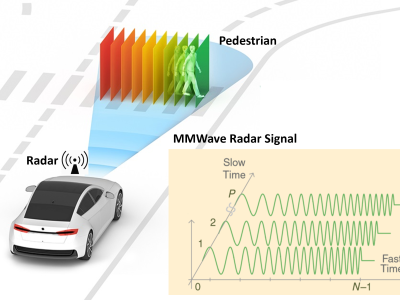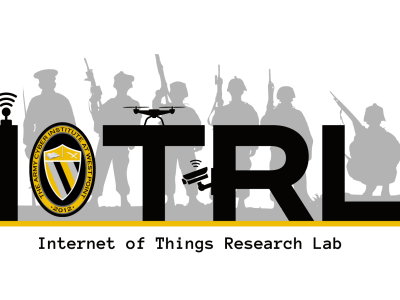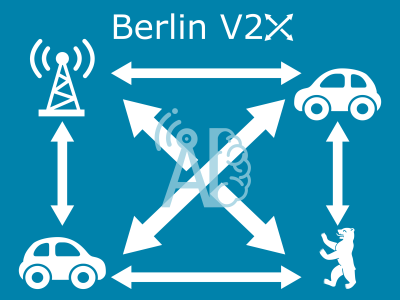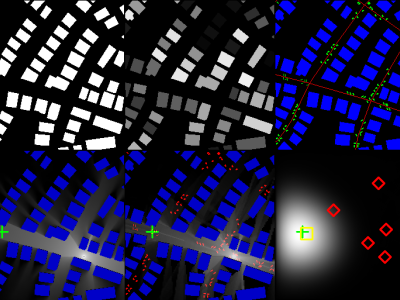O-RAN experimental evaluation datasets
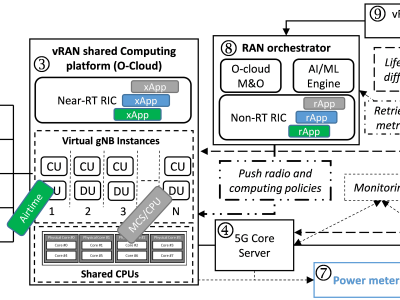
- Citation Author(s):
-
J. Xavier Salvat LozanoJose A. Ayala-RomeroLanfranco ZanziAndres Garcia-SaavedraXavier Costa-Perez
- Submitted by:
- Jose Ayala-Romero
- Last updated:
- DOI:
- 10.21227/64s5-q431
- Data Format:
Abstract
The Open Radio Access Network (O-RAN) Alliance's most recent innovations are propelling the evolution of RAN deployments, moving away from conventionally closed and specialized hardware implementations and toward virtualized instances running over shared platforms and distinguished by open interfaces. Such progressive decoupling of radio software components from the hardware is paving the road for future efficient and cost-effective RAN deployments. However, there are still a lot of open challenges before O-RAN networks can be successfully deployed. Many of these open challenges include real-time network parameter configuration to maximize performance, providing enough computing resources required for vRAN deployment, and how to share processing units among multiple vRAN instances reliably. To shed light on these aspects, we have released the following datasets, which collect experimental data from published papers that research O-RAN deployments for 5G networks. It includes rich data on computing consumption, energy consumption, and other aspects that can help other researchers to develop a new solution for O-RAN deployments.
Instructions:
This folders contain the datasets for the paper "Evaluation of O-RAN 5G and 6G Networks: Experimental Design and Data". All the datasets are in CSV format and can be easily loaded using pandas. The datasets are organized in three folders corresponding to three different network settings.
1. Folder computing_datasets
It contains the datasets with the computing utilization per core. The folder has two subfolders
named datasets_unpin and datasets_pin with all the measurements for the cases of unpinned gNBs and pinned gNBs. * Datasets inside the folder datasets_unpin measure the commputing utilization per core when deploying a number of vBSs that can use all the CPUs available. * Datasets inside the folder datasets_unpin measure the commputing utilization per core when deploying a number of vBSs with specific pinning configurations
1.1. Dataset columns
Configurations:- "mcs_dl_i": Downlink MCS index of vBS i
- "mcs_ul_i": Uplink MCS index of vBS i
- "dl_kbps_i": Downlink traffic demand in kbps of vBS i
- "ul_kbps_i": Downlink traffic demand in kbps of vBS i
- "cpu_set": Computing set used by vBS i
- "cpu_i": Avg. measured CPU utilization between 0 and 1. The computing cores from 4-7 are the hyperthreads of cores 0-3
- "explode": Whether the experiment has run correctly or not
2. Folder energy_datasets
It contains two the energy measurement datasets. The file dataset_ul.csv provides a set of measurement of performance and power consumption of a virtualized Base Station when using only the uplink chanel. On the other hand, the file dataset_dlul.csv provides a set of measurement of performance and power consumption when using both the downlink and uplink channel.
2.1. Dataset columns for dataset_ul.csv
Configurations:- "date": Timestamp of the measurement
- "cpu_platform": CPU model of the computing platform running the BBU
- "BW": Bandwidth of the LTE interface in number of resource block. For instance, BW = 50 -> 10 MHz
- "TM": Transmission mode
- "UL/DL": Indicates if we consider the Uplink (UL), the downlink (DL), or both (DLUL)
- "txgain": Transmission gain of the USRP implementing the UE
- "traffic_load": Uplink traffic load
- "selected_mcs": Selected MCS on the uplink
- "selected_airtime": Selected airtime on the uplink
- "mean_used_mcs": Average MCS used during the experiment on the uplink
- "bsr": Average Buffer Status Report uplink
- "num_ues": Number of UE associated with the BS
- "thr": Average throughput uplink
- "gput": Average Goodput uplink
- "mean_snr": Average SNR measured during the experiment on the uplink
- "bler": Average Block Error Rate uplink
- "turbodec_it": Average number of turbo decoder iterations during the experiment
- "overflows": Mean number of overflows (O) from UHD driver
- "underflows": Mean number of underflows (U) from UHD driver
- "lates": Mean number of Lates (L) from UHD driver
- "dec_time": Average subframe decoding time (usec)
- "pm_power": Average power consumed by the BBU measured externally using the digital power meter
- "pm_var": Variance of the power consumed by the BBU measured externally using the digital power meter
- "n_pm": Number of samples of consumed power taken by the digital power meter during the experiment
- "rapl_power": Average power consumed by the CPU of the BBU measured using the RAPL functionality
- "rapl_var": Variance of the power consumed by the CPU of the BBU measured using the RAPL functionality
- "n_rapl": Number of samples of consumed power taken by the RAPL functionality during the experiment
- "clockspeed": Average clockspeed of the CPU running the BBU
- "nRBs": Average number of Resource Blocks used in the uplink
- "airtime": Average measured airtime on the uplink
- "fixed_mcs_flag": if 0, the value of the fields 'selected_mcs_dl' and 'selected_mcs_dl' is taken as an upper bound, i.e., the radio scheduler can select lower values for the MCS when it is required by the radio channel. If 1, the radio scheduler is forced to use these MCS values. When the channel quality is poor, decoding errors may occur
- "failed_experiment": If 1, it indicates that the experiment has failed due to decoding error
2.2. Dataset columns for dataset_dlul.csv
Configurations:- "date": Timestamp of the measurement
- "cpu_platform": CPU model of the computing platform running the BBU
- "BW": Bandwidth of the LTE interface in number of resource block. For instance, BW = 50 -> 10 MHz
- "UL/DL": Indicates if we consider the Uplink (UL), the downlink (DL), or both (DLUL)
- "TM": Transmission mode
- "traffic_load_dl": Downlink traffic load
- "traffic_load_ul": Uplink traffic load
- "txgain_dl": Transmission gain of the USRP implementing the BS
- "txgain_ul": Transmission gain of the USRP implementing the UE
- "selected_mcs_dl": Selected MCS on the downlink
- "selected_mcs_ul": Selected MCS on the uplink
- "selected_airtime_dl": Selected airtime on the downlink
- "selected_airtime_ul": Selected airtime on the uplink
- "mean_used_mcs_dl": Average MCS used during the experiment on the downlink
- "mean_used_mcs_ul": Average MCS used during the experiment on the uplink
- "bsr_dl": Average Buffer Status Report downlink
- "bsr_ul": Average Buffer Status Report uplink
- "gput_ul": Average Goodput uplink
- "mean_snr_ul": Average SNR measured during the experiment on the uplink
- "turbodec_it": Average number of turbo decoder iterations during the experiment
- "dec_time": Average decoding time
- "nRBs_ul": Average number of Resource Blocks used in the uplink
- "num_ues": Number of UE associated with the BS
- "thr_dl": Average throughput downlink
- "thr_ul": Average throughput uplink
- "bler_dl": Average Block Error Rate downlink
- "bler_ul": Average Block Error Rate uplink
- "tbs_dl": Average Transport Block Size downlink
- "pm_power": Average power consumed by the BBU measured externally using the digital power meter
- "pm_var": Variance of the power consumed by the BBU measured externally using the digital power meter
- "pm_median": Median of the power consumed by the BBU measured externally using the digital power meter
- "n_pm": Number of samples of consumed power taken by the digital power meter during the experiment
- "rapl_power": Average power consumed by the CPU of the BBU measured using the RAPL functionality
- "rapl_var": Variance of the power consumed by the CPU of the BBU measured using the RAPL functionality
- "n_rapl": Number of samples of consumed power taken by the RAPL functionality during the experiment
- "clockspeed": Average clockspeed of the CPU running the BBU
- "airtime_dl": Average measured airtime on the downlink
- "airtime_ul": Average measured airtime on the uplink
- "cqi_dl": Average CQI value on the downlink
- "cqi_ul": Average CQI value on the uplink
- "fixed_mcs_flag": if 0, the value of the fields 'selected_mcs_dl' and 'selected_mcs_dl' is taken as an upper bound, i.e., the radio scheduler can select lower values for the MCS when it is required by the radio channel. If 1, the radio scheduler is forced to use these MCS values. When the channel quality is poor, decoding errors may occur
- "failed_experiment": If 1, it indicates that the experiment has failed due to decoding error
3. Folder application_datasets
It contains the dataset of measurements of performance and power consumption of an AI service at the network edge.
3.1. Dataset columns
Configurations:- "date_exp": Timestamp of the measurement
- "gpu_platform": GPU model running the AI service at the edge server
- "BW": Bandwidth of the LTE interface in number of resource blocks. For instance, BW = 100 -> 20 MHz
- "img_resolution": Percentage of the original size of the image. For instance, when img_resolution is 50, the size of the image is half of the original.
- "airtime_ratio": Ratio of the amount of radio resources (time) the BS allocates to the uplink.
- "gpu_power": GPU processing speed in terms of maximum consumed power. The higher this value the higher the processing speed.
- "av_end2end_delay": Average end-to-end delay. Average of the time incurred by a user request (an image) to be delivered to the service, plus the processing time of the server (GPU delay), plus the time incurred by the reply (bounding boxes and labels) to be delivered to the user.
- "av_imp_proc_delay": Average time to load and resize the images at the user side.
- "av_gpu_delay": Average delay associated with the GPU tasks only.
- "av_num_obj": Average number of detected object
- "av_obj_size": Average object size.
- "AP1": Average Precision (AP) @[ IoU=0.50:0.95 | area= all | maxDets=100 ]
- "AP2": Average Precision (AP) @[ IoU=0.50 | area= all | maxDets=100 ]
- "AP3": Average Precision (AP) @[ IoU=0.75 | area= all | maxDets=100 ]
- "AP4": Average Precision (AP) @[ IoU=0.50:0.95 | area= small | maxDets=100 ]
- "AP5": Average Precision (AP) @[ IoU=0.50:0.95 | area=medium | maxDets=100 ]
- "AP6": Average Precision (AP) @[ IoU=0.50:0.95 | area= large | maxDets=100 ]
- "AR1": Average Recall (AR) @[ IoU=0.50:0.95 | area= all | maxDets= 1 ]
- "AR2": Average Recall (AR) @[ IoU=0.50:0.95 | area= all | maxDets= 10 ]
- "AR3": Average Recall (AR) @[ IoU=0.50:0.95 | area= all | maxDets=100 ]
- "AR4": Average Recall (AR) @[ IoU=0.50:0.95 | area= small | maxDets=100 ]
- "AR5": Average Recall (AR) @[ IoU=0.50:0.95 | area=medium | maxDets=100 ]
- "AR6": Average Recall (AR) @[ IoU=0.50:0.95 | area= large | maxDets=100 ]
- "powermeter_av": Average power consumed by the edge server measured externally using the digital power meter.
- "powermeter_var": Variance of the power consumed by the edge server measured externally using the digital power meter.
- "powermeter_median": Median of the power consumed by the edge server measured externally using the digital power meter.
- "rapl_av": Average power consumed by the CPU of the edge server measured using the RAPL functionality.
- "rapl_var": Variance of the power consumed by the CPU of the edge server measured using the RAPL functionality.
- "gpu_av": Average power consumed by the GPU of the edge server measured using the Nvidia driver.
- "gpu_var": Variance of power consumed by the GPU of the edge server measured using the Nvidia driver.
- "clocksp_av": Average clock speed of the CPU of the edge server.
 4628 views
4628 views



